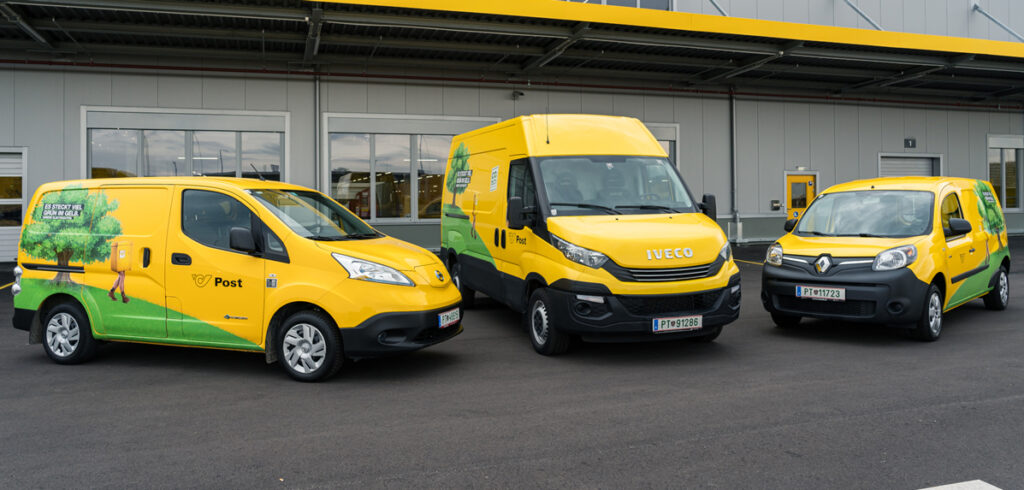Sandra Roling, head of EV100 at the Climate Group, takes an in-depth look at the findings of the 2021 EV100 Progress and Insights Report and the global transition to electric vehicles.
Transport represents almost a quarter of Europe’s GHG emissions and is the main cause of air pollution in cities. Within this, road transport is the biggest emitter. Following a year where we’ve been increasingly aware of the air around us, businesses – including many postal services – are taking responsibility for their role in creating a safer and cleaner world.
EV100 is a global initiative run by the Climate Group that brings together forward-looking companies committed to making electric vehicles (EVs) the new normal by 2030. More than 100 companies have signed up to EV100, committing nearly five million EVs to being on roads by 2030. In emissions terms, that means 75 million metric tons of CO2 emissions are set to be avoided by end of the decade.
The key findings
We produce an annual EV100 Progress and Insights Report to show how our members are performing, to celebrate success stories and highlight the issues that our members are facing in their pursuit of fully electric fleets. In 2020 we have been particularly excited to see that, despite a year of Covid disruption, the number of EVs on the road operated by EV100 businesses has risen to 169,000 vehicles – over twice the number in the previous year.
The businesses in this initiative are not just changing their fleets, they are also using their property portfolios – their offices and stores – to offer a network of charging infrastructure that supports their staff and customers alike. There has been a boom in planned charging infrastructure this year: 6,500 locations have been committed to have charging installed, a 103% increase on last year. There has also been an 84% increase in the number of locations with charging already installed, to nearly 2,100, and the number of individual charge points installed has increased by 79% to nearly 16,900.
Lessons for the industry
An important part of this leadership has come from the postal and delivery sector. It is worth highlighting that two out of our three largest corporate EV deployments within the membership are from postal companies (Deutsche Post DHL has deployed 11,511 vehicles and Swiss Post has deployed 5,868). These examples reflect the strong business case for electric vehicles particularly in urban contexts.
As seen by many postal fleets already, despite the upfront cost of EVs being higher, over its lifespan an electric fleet is significantly cheaper. For example, EV100 member Austrian Post has deployed over 1,000 EVs already and has found that as well as seeing significant fuel savings from battery electric vehicles (BEVs), the simplified construction of BEVs means maintenance costs have reduced by more than 50%. As all readers will know, this is vital for delivery vehicles that are stopping and starting up to 200 times per day.
Another trend we see reflected in EV100 members’ experiences is the introduction of smaller and more flexible vehicle solutions. Swiss Post, for example, has deployed over 5,800 2/3-wheel electric motorized commercial vehicles to support with deliveries, which is particularly important in crowded city centers.
Barriers our members are facing
Of course, some barriers to the uptake of EVs still remain. EV100 members have reported lack of charging infrastructure, lack of correct vehicle type and capital cost as the most significant barriers they face. The lack of availability of the correct vehicle type is one of the top two barriers in the EU, France, India, Japan, the UK and the USA, with light-commercial and heavy-duty vehicles the segments posing most difficulties.
Nevertheless, progress is clearly visible here as well, with our report showing a 23% increase in electric 4-wheel+ commercial vehicles over the past year. Again, postal companies are at the forefront of driving the transition. Deutsche Post DHL, for example, has nearly tripled its number of medium- to heavy-duty electric vehicles, and among others debuted the UK’s first purpose-built, fully electric 16-metric-ton truck in London, UK, last November.
Future steps
So, how do companies address the challenge when their needs still cannot be met within the existing vehicle offer?
It might mean actually leading the innovation required. EV100 member IKEA Retail (Ingka Group) has a target to reach zero-emission deliveries globally by 2025, meaning that they can’t wait around for others to come up with solutions to their problems. So, they collaborated with OEMs Renault and MAN to co-create a fit-for purpose delivery truck. Its bespoke design enables them to optimize deliveries and reduce the number of vehicles on the road. The new model is currently being showcased across Europe, aiming to encourage as many of IKEA’s partners as possible to start using it. The new trucks were on the roads of Paris within six months of the first meeting with their partners – showing how much is already possible for those willing to put in the extra bit of dedication.
The future is coming up fast, and the postal sector is among those where the benefits are already the most obvious, both for companies’ bottom lines and the air quality in urban city centers.
The time to commit is now – we’re looking forward to many more companies joining us in the electric vehicle revolution.
The EV100 Progress and Insights Report was published on February 17, 2021, and can be viewed here.
You can find out more about EV100 and meet Sandra in this short video.


